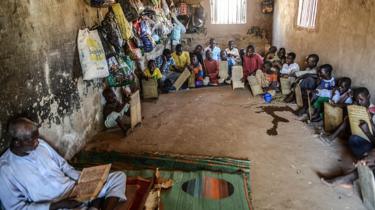Powerful politicians in northern Nigeria are pushing for the scrapping of controversial Koranic schools after some pupils found themselves at the centre of the coronavirus outbreak, write the BBC’s Nduka Orjinmo and Mansur Abubakar.
Tens of thousands of Koranic school children were recently crammed into open vans and sent back home from cities and towns across northern Nigeria in a controversial move by state governments to prevent the spread of coronavirus within their territories.
There was a ban on travel, but the vans, with children sitting shoulder-to-shoulder, were allowed to criss-cross the country’s highways to get the boys to their homes in villages, often thousands of miles away.
All of Nigeria’s 19 northern states had two-way movement – some children were leaving for home while others were returning home.
It was probably one of the biggest ever state organised mass movements of minors in Africa’s most-populous state, whose population of around 200 million is divided roughly equally between Muslims and Christians.
Large numbers of child beggars used to roam the streets of Kano
No-one knows how many of the children – known in the local Hausa language as almajirai (singular almajiri), which is derived from the Arabic word al-Muhajirun, or emigrant – were sent home but Kaduna state alone said it had repatriated 30,000.
What no-one knew was that hundreds of the children already had coronavirus, so officials had inadvertently contributed to spreading the virus rather than containing it.
‘Time bomb warning ignored’
As the children arrived in their home states, some of them were quarantined and tested.
The results caused widespread consternation – of the 169 tested in Kaduna, 65 were positive, as were 91 of the 168 tested in Jigawa.
It is unclear how the children got infected
In Gombe, eight of the 48 children tested had Covid-19. In Bauchi, the number was seven out of 38.
Hundreds of test results are still being awaited, while many thousands more have not been tested – Nigeria has faced criticism for its low testing rate.
The head of Nigeria’s presidential task force on Covid-19, Boss Mustapha, had warned that the repatriations could cause a “time bomb”, but northern state governors ignored him.
They saw the pandemic as an opportunity to scrap the almajirai-based Koranic schools that have long been part of the Islamic education system in the mainly Muslim north.
“We’ve been looking for ways and means to end this system because it has not worked for the children. It has not worked for northern Nigeria and it has not worked for Nigeria. So, it has to end and this is the time,” said Kaduna state governor Nasir el-Rufai.
He added it was better to give the almajirai “some kind of modern education than to allow them to waste their lives away, roaming about the streets begging for what to eat”.
“In Kaduna state, the almajiri system is dead,” Mr el-Rufai said.
The almajirai are mostly children from poor homes who go to live for five to 10 years in a boarding-house style setting to memorise the Koran under a teacher, known as a mallam.
Muslims believe those who memorise the Koran will go to heaven
About 10.5 million Nigerian children aged between five and 14 years are not in school, according to the UN children’s agency, Unicef.
Unicef does not consider the almajirai as being in school so they make up a large part – if not the majority – of this number.
Children sent to beg on streets
The almajirai-based schools admit children as young as five, and they are expected to give their teachers the token sum of 100 naira ($0.30; £0.25) every Wednesday, which is the end of the week for the pupils with Thursday and Friday – a religious day for Muslims – being their weekend.
The mallams say the money is for the maintenance of the schools, and they do not pocket it.
Most almajirai have no means of paying and resort to begging on the streets to get the money. Sometimes they carry out menial jobs for families, in exchange for food or clothes.
They often live in squalid conditions with poor hygiene, and can go without a bath for weeks, despite the fact that Islam puts huge emphasis on cleanliness.
The mallams themselves are mostly poor, untrained, and unregulated. They tend to teach, and do subsistence farming. Some children help out on the farms, without getting anything in return.
Source: BBC





